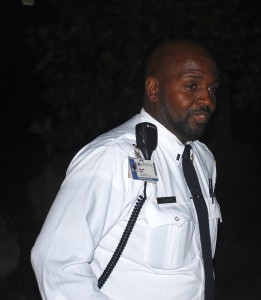UR President Joel Seligman approved a series of recommendations on Wednesday to improve campus Security Services after a year-long review of campus policies conducted by Senior Vice President for Administration and Finance Ronald Paprocki, senior administrators, Security officers and members of the University community.
The most significant change will be the process of establishing sworn officer presence among the security staff, according to a statement released by Seligman.
Sworn staff will have greater access to government criminal information, the legal authority to make arrests based on probable cause if a felony, misdemeanor or other breach of peace is committed, and the ability to intervene in mental health emergencies, according to Seligman.
Over the next 18 months, about 40 members of UR’s 120-person security staff will complete New York’s campus peace officer academy program to become sworn officers, which entails 332 hours of additional training.
Sworn officers will carry batons and pepper foam as “defensive weapons,” but will not carry firearms or tasers, while non-sworn patrol officers will carry pepper foam for their personal protection.
“Almost all of our peer institutions are protected by sworn officers with safety equipment rather than licensed security guards alone,” Seligman wrote in his statement. “Many of these universities have armed officers on their campuses. We do not believe that armed security is appropriate at Rochester.”
Paprocki said UR concluded that firearms “are not necessary in our particular situation after consulting with various campus constituents” and finding a “widespread reluctance to see firearms on campus.”
“It’s going to be an opportunity to be better prepared to support and protect the campus,” Director of University Security Walter Mauldin said. One of the major advantages to having officers in the sworn capacity will be a faster response in mental health emergencies, he said. Currently, Security sometimes has to wait up to an hour for public health officials to respond to a situation if the individual does not immediately comply, according to Mauldin.
Mauldin also said that the sworn officer program will give those interested in careers in public safety greater career opportunities and chances for professional development. The program will offer more advanced training opportunities in investigative technology, forensic sciences and interpersonal relationship skills.
Mauldin said the University’s Security force, which he described as “pretty large” for a university of UR’s size, might increase as a result of the report, though exact numbers haven’t been determined. “We hope this positions UR as a national model for other universities’ security forces,” he added.
Other security recommendations released in the report include increasing in-service training, improving internal communications and electronic technology and strengthening the relationships between Security and students.
The policy analysis began before the death of Jeffrey Bordeaux, Jr. in January 2011 and was conducted separately. The independent review of the Bordeaux incident found that “Security’s response to the event was exemplary, and nothing in my recommendations would have changed that response,” Paprocki said.
He said some of the changes will be implemented quickly, while others are expected to take about 18 months to complete.
Paprocki does not anticipate that “students will necessarily notice these changes except that Security will be able to resolve situations more quickly than in the past,” but said he felt it was time UR moved toward increasing security given the nationwide focus on such matters and the recent growth of UR’s campus.
“The leaders, supervisory staff and line officers in Security Services provide essential services in times of stress, anxiety and danger,” Seligman wrote in his statement. “We owe them our support.”
Buletti is a member of the class of 2013.



